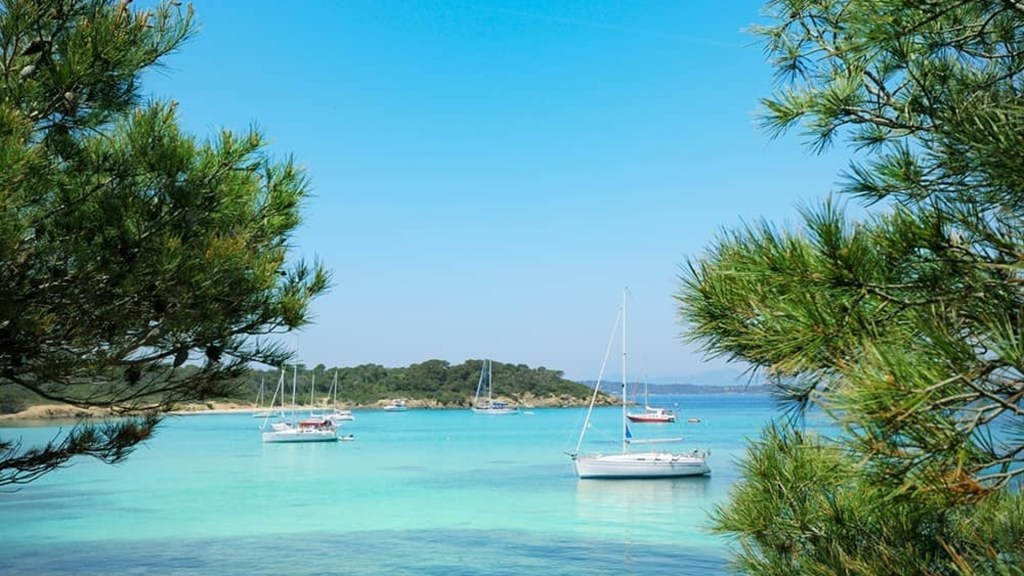Nothing in the beach hotel was made of plastic. It wasn’t advertised as being a plastic-free hotel, but we noticed it. Nor was there a television in the room nor air conditioning nor a “no smoking” notice on the wall nor a list of hotel rules. Instead there was a wall of books in the reception area, ashtrays from the golden age of smoking, sea breezes and an air of greater liberty. When I presented myself at reception to check in, the woman didn’t want to see a credit or identity card — my Christian name was credential enough. She led us up the marble-slatted stairs, unlocked the door with an old-fashioned key, wished us a very pleasant stay, and went away again.
The decor of our second-floor room with balcony was artfully artless early 1960s, designed by a genius. I lay on the bed under the slow ceiling fan and imagined the scent of Gauloise cigarettes and heard the faintest echo of Charles Trenet singing “La mer” on a gramophone somewhere below. If there was a Figaro lying around somewhere, I wouldn’t have been surprised to read in it that Algeria was still part of France.
Our balcony overlooked the hotel restaurant and the wide sea. Enclosing the bay were the islands of Porquerolles, Port-Cros and Le Levant. The Mediterranean was glassy flat. Paddleboarders and elderly sea hikers swinging their old arms passed slowly back and forth. Catriona burst into tears.
We unpacked and clattered down the stairs for a pre-dinner drink. “How goes it?” asked one of the hotel restaurant waiters, laying tables, barefoot in the soft white sand. “Could be worse,” I said. He looked shocked. “I doubt it,” he said. He showed us to a table within spitting distance of the lapping wavelets. The gin measures were stonking. The tonics came in old-fashioned bottles.
I looked around at those still on their sun loungers or coming and going between the restaurant tables. Solidly French, ages ranging from babies to the fantastically old. Roughly half the adults were smoking. Paperbacks outnumbered devices. But what social class of French were these, I wondered? The rooms weren’t cheap. Lower-middle exercising a nostalgia for Les Trente Glorieuses? Former Poujadists? Never good at identifying French economic or social classes, here I couldn’t begin to guess. Given the slightest opening, however, everyone was most friendly, natural and without pretension. It was like a members’ club for people who “got” the hotel. Later on we enquired about future available dates, and the woman said it was completely booked for the rest of the summer.
Between drinks and dinner I walked into the warm shallow sea. Soft sand, then a shoreline of pebbles, then comfortable wrinkled sand under the clear water. I watched an old man with his shorts hauled up over his navel give a comic performance for anyone who might be watching of someone unused to walking over stones in bare feet. With each wobbling step his old comic’s face registered shock, determination, agony and misery. When he noticed that he had an appreciative audience of one, he scowled jovially. A shoal of small fry leapt out of the water close by and he started and windmilled his arms to stop himself toppling. I walked out forty yards before it was deep enough to swim.
I kept on my wet trunks for dinner. Others were elegant and chic. Every so often a dinghy crammed with people from one or other of the yachts moored far out in the bay approached the hotel and the passengers scrambled happily ashore like illegal migrants and made for one of the longer restaurant tables. Invariably they had with them one or two slender young women with lovely sunned backs and spare midriffs who carried their youthful beauty as if constrained by a physical handicap. In spite of that, theirs were the most tanned, relaxed and convivial tables. My landlubber’s liberty, I realized, was nothing to theirs, and I experienced a touch of envy.
We ate all our meals at the excellent hotel restaurant and between meals I slept and Catriona read. Forty hours of feeling slightly damp, slightly salty and lulled to a deeper insensibility each night by the muted crashing of the waves. On the sad morning when we went downstairs to check out, the comic old man and his wife were there in reception, also preparing to leave. He picked a straw hat from the free-straw-hat basket, passed it behind his head, spun it down an extended arm, caught it in his hand and stepped forward with an entertainer’s flourish. I laughed. “Thirty years a clown in the circus,” he said, thrusting out his lower lip.
The Lido Beach Hotel and restaurant at Hyères: solidly, wonderfully French; could be a lot worse.
This article was originally published in The Spectator’s August 2022 World edition.





















